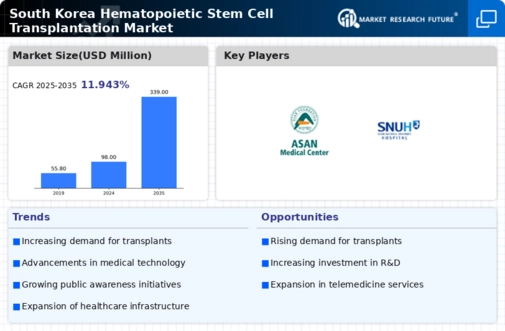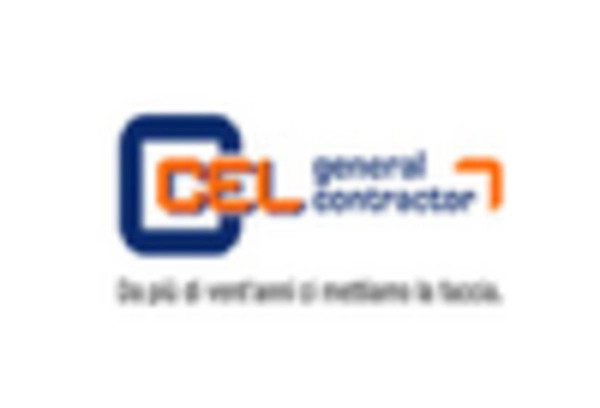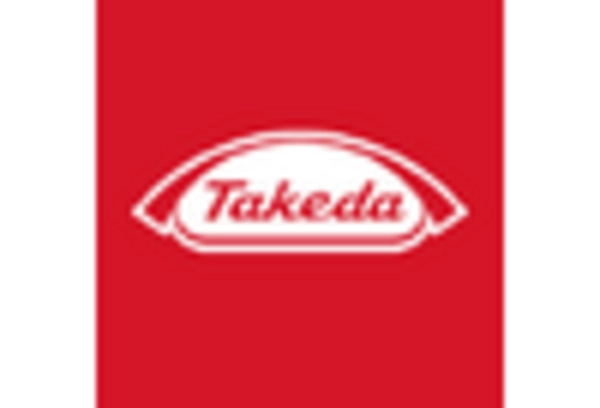Advancements in Stem Cell Research
Ongoing advancements in stem cell research are significantly influencing the hematopoietic stem-cell-transplantation market. Research institutions in South Korea are focusing on innovative techniques to enhance the efficacy and safety of transplants. For instance, the development of gene editing technologies and improved donor matching algorithms may lead to better patient outcomes. The South Korean government has allocated over $50 million in funding for stem cell research initiatives in 2025, which is expected to accelerate the pace of discoveries. Such advancements not only improve treatment options but also attract investment into the hematopoietic stem-cell-transplantation market, fostering further growth.
Expansion of Healthcare Infrastructure
The expansion of healthcare infrastructure in South Korea is a vital driver for the hematopoietic stem-cell-transplantation market. With the government investing heavily in healthcare facilities and technologies, access to advanced medical services is improving. In 2025, the number of specialized transplant centers is expected to increase by 20%, providing more patients with access to hematopoietic stem-cell-transplantation. This growth in infrastructure not only enhances the capacity for performing transplants but also improves the overall quality of care. As a result, the hematopoietic stem-cell-transplantation market is poised for significant growth, driven by increased patient access and improved treatment outcomes.
Rising Demand for Personalized Medicine
The increasing demand for personalized medicine is reshaping the landscape of the hematopoietic stem-cell-transplantation market. Patients are increasingly seeking tailored treatment options that cater to their specific genetic profiles. This trend is particularly evident in South Korea, where healthcare providers are adopting precision medicine approaches. The market for personalized medicine is projected to grow at a CAGR of 12% over the next five years, indicating a robust interest in customized therapies. As healthcare systems evolve to accommodate this demand, the hematopoietic stem-cell-transplantation market is likely to benefit from enhanced treatment protocols and improved patient satisfaction.
Collaboration Between Public and Private Sectors
Collaboration between public and private sectors is emerging as a key driver for the hematopoietic stem-cell-transplantation market. Partnerships between government agencies, research institutions, and private companies are fostering innovation and improving treatment options. In South Korea, several initiatives have been launched to promote joint research projects and clinical trials, which are expected to enhance the development of new therapies. This collaborative approach is likely to lead to a more robust pipeline of treatments, thereby expanding the hematopoietic stem-cell-transplantation market. The synergy between public and private entities may also attract additional funding, further bolstering the industry's growth.
Increasing Awareness of Stem Cell Transplantation
The growing awareness regarding the benefits of hematopoietic stem-cell-transplantation is a crucial driver for the market in South Korea. Educational campaigns and initiatives by healthcare organizations have led to a better understanding of the procedure among patients and healthcare professionals. This heightened awareness is likely to increase the number of patients seeking treatment, thereby expanding the hematopoietic stem-cell-transplantation market. In 2025, it is estimated that approximately 15,000 stem cell transplants will be performed in South Korea, reflecting a 10% increase from previous years. This trend indicates a shift in public perception, which is essential for the growth of the industry.
















